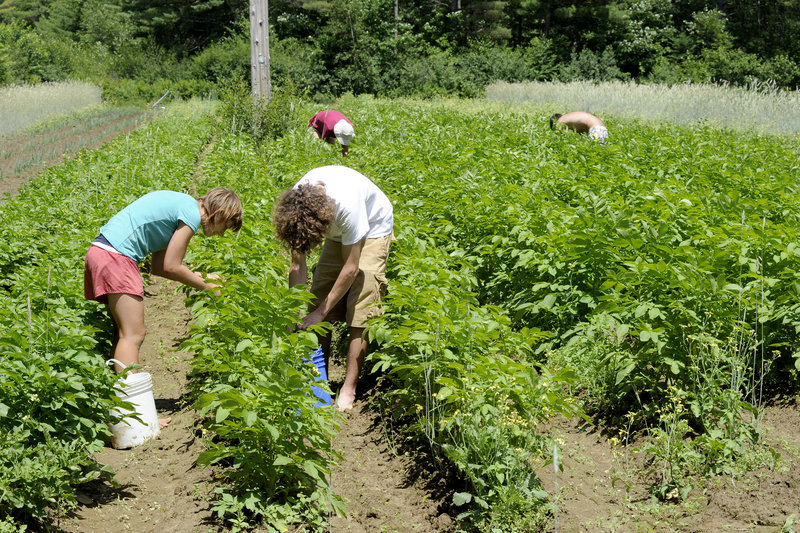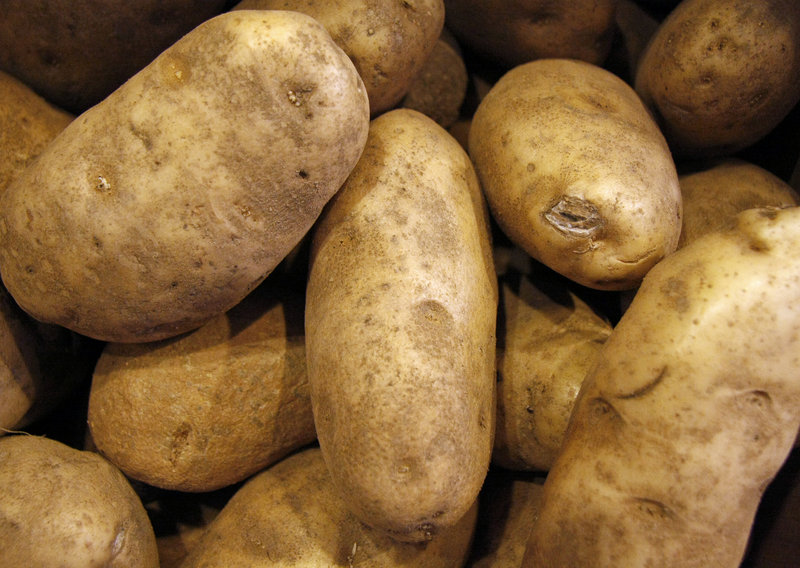Maine potato advocates have launched a campaign to get the vegetable back on the good foods list for a federal nutrition program.
Not only has Maine’s congressional delegation gotten involved, but nutritionists and food researchers are joining the effort to convince the U.S. Department of Agriculture to include the white potato on the list of foods it will provide through the Women, Infants and Children Program.
WIC, as the program is called, provides food vouchers for low-income pregnant women, infants and children who are nutritionally at risk. Participants can only use the money to buy qualifying foods.
“When I see they are not going to let poor women who have limited access to something that is filling, provides a lot of nutritional benefits and their kids will eat really bothers me,” said Mary Ellen Camire, potato researcher and professor at the University of Maine, Orono.
At issue is the white potato, Maine’s largest vegetable crop, already under siege by proponents of low-carbohydrate diets who say it is a major contributor to diabetes and obesity.
When the USDA revised the WIC program’s food package in 2007, which is basically a prescriptive diet for pregnant and postpartum women, it made vegetables and fruits eligible for WIC participants for the first time. The white potato was the only vegetable or fruit excluded from the list of approved foods.
Mainers enrolled in the Maine Food Supplement Program, also known as food stamps, face no restrictions on the types of foods they may purchase with that allocation.
Jean Daniel, USDA spokeswoman, said the list of approved foods was based on recommendations from the National Academies of Science Institute of Medicines. The reasoning in excluding the potato from the WIC food package was that people were already obtaining enough potatoes in their diets.
“People are not eating enough green leafy vegetables and orange vegetables, but they were eating sufficient white potatoes,” said Daniel.
The federal revision has been making its away through the slow-moving federal rule making process ever since. The Maine Potato Board, which promotes the state’s potato industry, has been working with other potato-growing states to reverse the exclusion before the process is complete in February.
“Why exclude one of the most nutritious foods? The reasoning doesn’t make sense,” said Don Flannery, executive director of the Maine Potato Board.
Maine is the sixth largest potato growing state in the country, trailing Idaho, Washington, North Dakota, Wisconsin and Colorado. Last year Maine produced 1.5 billion pounds of the humble tuber.
About 9.3 million women, infants and children participated in WIC last year, 26,000 of them in Maine.
Maine potato advocates say it is a mistake to leave the potato off the approved list. Camire said research linking obesity and diabetes to potatoes is flawed because it is based on large health studies that never differentiated the types of potatoes, such as high-fat fries, or lifestyles of the participants.
Camire said potatoes are high in vitamin C and a good source of B vitamins and potassium. The skins are also high in fiber. She said some of the pigmented potatoes, such as blue-fleshed varieties, provide the same antioxidant properties as blueberries.
Maine WIC officials agree potatoes are too valuable a source of vitamins and nutrition to leave off the list and twice supported potatoes during the federal rule-making process.
“The frozen products have a lot of added fat and sodium but the fresh white potato is extremely versatile and can be included in a very healthy diet,” said Karen Gallagher, a nutritionist with Maine’s WIC Nutrition Program.
Earlier this month Democratic Rep. Michael Michaud, whose district includes the state’s biggest potato growers, joined 22 congressmen from large potato-producing states in urging federal Agriculture Secretary Tom Vilsak to put the potato on the approved list. They were joined by Maine Republican Sens. Olympia Snowe and Susan Collins and 17 other senators.
Although the public comment period of the process is over, Michaud has urged Mainers to continue to fight the exclusion and has invited people to send him comments.
Maine farmers say they want their potatoes to be available to WIC participants who may purchase fresh produce from about 80 participating farmers markets and farm stands.
“A lot of people like potatoes, especially kids,” said Bruce Hincks, co-owner of Meadowood Farm in Yarmouth where he raises red potatoes, Yukon gold, banana and other varieties.
Penny Jordan of Jordan’s Farm in Cape Elizabeth said locally grown potatoes should be made available to WIC participants. A pound of her small new potatoes goes for $1.50.
“This is such a bureaucratic decision,” she said.
Staff Writer Beth Quimby can be contacted at 791-6363 or at:
bquimby@pressherald.com
Send questions/comments to the editors.





Success. Please wait for the page to reload. If the page does not reload within 5 seconds, please refresh the page.
Enter your email and password to access comments.
Hi, to comment on stories you must . This profile is in addition to your subscription and website login.
Already have a commenting profile? .
Invalid username/password.
Please check your email to confirm and complete your registration.
Only subscribers are eligible to post comments. Please subscribe or login first for digital access. Here’s why.
Use the form below to reset your password. When you've submitted your account email, we will send an email with a reset code.